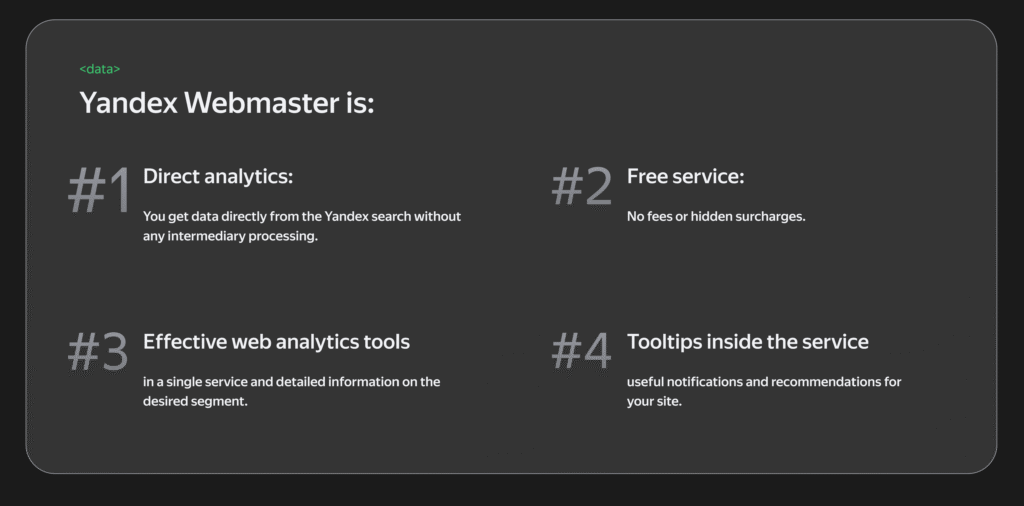Most SEO professionals treat Yandex like it’s just Google with a different logo. That mindset is exactly why their Russian market campaigns tank spectacularly. Yandex operates on fundamentally different ranking signals – from its obsession with user behavior metrics to its unique approach to link analysis – and if you’re tracking keywords the same way you do for Google, you’re essentially flying blind.
Top Yandex SEO Keyword Ranking Tools
Finding a reliable Yandex SEO keyword ranking tool feels like searching for a needle in a haystack. Most mainstream SEO platforms barely acknowledge Yandex exists. But here’s the thing: the tools that actually work for Yandex tracking have been quietly perfecting their craft while everyone else chases Google updates.
1. SE Ranking
SE Ranking understands that Yandex isn’t just another search engine checkbox to tick. Their platform tracks rankings across all major Yandex regions (not just Moscow) and provides historical data going back years. You get daily ranking updates, SERP feature tracking specific to Yandex’s unique elements like Turbo pages, and competitor analysis that actually makes sense for the Russian market. The kicker? Their pricing starts at $39/month for 500 keywords.
What sets SE Ranking apart is their local pack tracking for Yandex.Maps integration – crucial if you’re doing local Russian SEO.
2. AccuRanker
AccuRanker brings enterprise-level precision to Yandex rank checker capabilities. Their claim to fame is speed – rankings update in real-time, not once a day like most tools. You can track unlimited domains and segment data by device type, which matters more for Yandex than you might think (mobile vs desktop behavior varies wildly in Russia).
The platform’s share of voice metrics help you understand not just where you rank, but how much of the total search visibility you actually own. At $109/month for 1,000 keywords, it’s pricey but worth it for serious campaigns.
3. Rank Tracker by Link-Assistant
Here’s where things get interesting. Rank Tracker is desktop software, not a cloud solution. Sounds outdated? Actually, it’s brilliant for Yandex tracking. You control the checking frequency, use your own proxies, and keep all data locally – perfect for sensitive Russian market data. The software handles unlimited keywords and websites for a one-time fee of $149 (or $349 for the enterprise version).
The real advantage: customizable ranking check algorithms that you can tune specifically for Yandex’s quirks.
4. Advanced Web Ranking
Advanced Web Ranking (AWR) takes a different approach. Instead of trying to be everything to everyone, they focus on accuracy and reporting depth. Their Yandex tracking includes city-level geo-targeting for over 150 Russian cities, white-label reports in Cyrillic, and API access for custom integrations. Plans start at $49/month for 2,000 keywords.
AWR’s strength lies in its reporting capabilities – you can create client reports that actually explain Yandex performance in terms that make sense to stakeholders.
5. Ranktracker
Ranktracker emerged as a dark horse in the Yandex keyword ranking tool space. They offer something unique: a dedicated Yandex keyword difficulty score that’s calculated differently from their Google metrics. The tool tracks both organic and paid positions, monitors SERP features, and provides competitor discovery specifically for Yandex.
Starting at $24/month for basic tracking, it’s the most affordable option that still delivers professional-grade data. Just don’t expect the bells and whistles of enterprise platforms.
6. Yandex Webmaster Tools

Let’s address the elephant in the room. Yandex’s own Webmaster Tools is free and provides ranking data straight from the source. You get search query reports, position tracking, and CTR data that no third-party tool can match for accuracy. The catch? It only shows data for your own sites, the interface is entirely in Russian (though Google Translate handles it well), and the historical data retention is limited.
Think of it as your verification tool – use it to spot-check what your paid tools are telling you.
Specialized Yandex Keyword Research Solutions
Tracking rankings is only half the battle. Finding the right keywords to track – that’s where most Yandex SEO campaigns actually fail. The keyword landscape in Russian search is completely different from what you’re used to with Google.
Yandex Wordstat
Yandex Wordstat is the godfather of Yandex keyword research. It’s free, it’s official, and it’s absolutely essential. The tool shows exact search volumes (not ranges like Google), regional distribution of searches, and seasonal trends going back two years. You can filter by device type and even see what else people searched for in the same session.
The operators are powerful once you learn them. Use quotes for exact match, exclamation marks to fix word forms, and plus signs to force word inclusion. Most importantly, Wordstat shows you the actual Russian search behavior patterns – not translated keywords from English.
Keyword Keg for Yandex
Keyword Keg adapted their platform specifically for Yandex users, and it shows. They pull data from multiple Russian-language sources, provide keyword difficulty scores calibrated for Yandex’s algorithm, and offer something unique: buyer intent classification for Russian search queries. Pricing starts at $38/month for 1,500 keywords.
Their “Import from Wordstat” feature alone saves hours of manual work.
Ranktracker Yandex Keyword Tool
Ranktracker deserves a second mention for their keyword research capabilities. Their Yandex keyword finder generates suggestions from actual Yandex autocomplete data, analyzes SERP competition specifically for Yandex’s ranking factors, and provides trend data that helps you spot seasonal opportunities in the Russian market.
What makes it special? The tool understands Cyrillic morphology. It knows that Russian words change form based on context and groups variations intelligently.
How to Choose the Right Yandex Rank Checker
Picking the right Yandex SEO tools isn’t about features lists or fancy dashboards. It’s about understanding what actually matters for your specific situation. Let me walk you through the decision framework that works.
Essential Features for Yandex SEO Tracking
Here’s what non-negotiable: accurate geo-targeting down to city level (Moscow rankings differ vastly from Novosibirsk), support for Cyrillic keywords without encoding issues, and mobile vs desktop segmentation. You also need SERP feature tracking for Yandex-specific elements: Turbo pages, Islands, and Knowledge Graph cards that work differently than Google’s.
Historical data matters more for Yandex than Google. Why? Yandex updates are less frequent but more dramatic. You need to spot trends over months, not days.
Don’t overlook API access. If you’re serious about Yandex SEO, you’ll want to pull data into your own dashboards eventually.
Pricing and Keyword Limits
Here’s the reality check: Yandex keyword tracking costs more per keyword than Google tracking. The infrastructure is more complex, the market is smaller, and fewer tools support it. Budget at least $50-100/month for professional tracking of 500-1000 keywords.
| Tool | Starting Price | Keywords Included | Cost per Additional 100 |
|---|---|---|---|
| SE Ranking | $39/month | 500 | $4 |
| AccuRanker | $109/month | 1,000 | $10 |
| Rank Tracker | $149 one-time | Unlimited | $0 |
| AWR | $49/month | 2,000 | $5 |
| Ranktracker | $24/month | 100 | $8 |
Watch for hidden costs: API calls, additional users, white-label reports, and historical data access often cost extra.
Local vs Global Ranking Capabilities
Yandex local search works differently than you’d expect. The engine uses a complex system called “Spectrum” that personalizes results based on user location, search history, and even time of day. Your tool needs to handle this complexity.
For local Russian businesses, you need city-specific tracking at minimum. For international sites targeting Russia, you need regional averages and the ability to exclude certain regions from your data. Crimea tracking, for instance, requires special handling due to various compliance requirements.
Mobile local results in Yandex can differ by up to 70% from desktop. That’s not a typo. Make sure your tool separates these clearly.
Integration with Other SEO Tools
Your Yandex rank checker shouldn’t exist in isolation. The best setups integrate with Google Analytics (yes, it works in Russia), Yandex.Metrica for traffic correlation, and general SEO platforms for technical auditing. API-first tools like AccuRanker excel here.
Consider data export formats too. Can you get raw CSV exports? JSON for developers? Direct database connections? You’ll need this flexibility as your Yandex presence grows.
But here’s the thing nobody talks about: most integrations assume Latin character encoding. Test Cyrillic data flow thoroughly before committing to a tool stack.
Selecting the Right Yandex SEO Tool for Your Business
After testing dozens of keyword ranking tools for Yandex, here’s the honest truth: there’s no perfect solution. Each tool makes trade-offs. SE Ranking offers the best balance for most businesses – reliable tracking, reasonable pricing, and enough features to grow with you. AccuRanker wins for enterprise needs where real-time data justifies the cost. Rank Tracker by Link-Assistant is perfect if you prefer owning your data and don’t mind desktop software.
For startups and small businesses, combine Yandex Webmaster Tools with Ranktracker. You’ll spend under $30/month and get 80% of what the expensive platforms offer. Just be prepared to do more manual work.
Remember: Yandex SEO isn’t just Russian Google. The ranking factors are different, the user behavior is unique, and the tools you choose need to respect these differences. Pick a tool that understands this, and you’re already ahead of 90% of your competition.
FAQs
What makes Yandex SEO different from Google SEO?
Yandex weighs user behavior signals much more heavily than Google – things like dwell time, return visits, and bookmark rates can outweigh traditional factors like backlinks. Yandex also uses its own link analysis algorithm called MatrixNet that evaluates link quality differently, and it places huge emphasis on regional relevance and local content. Plus, Yandex understands Russian language morphology natively, so it handles word forms and synonyms in ways Google’s Russian search can’t match.
Can I use free tools to track Yandex rankings?
Yes, but with major limitations. Yandex Webmaster Tools provides free ranking data for your own sites, but lacks competitor tracking and historical depth. Some tools like SERPstat offer limited free checks, usually 5-10 queries per day. For serious tracking, you’ll need a paid solution – the free options simply don’t provide the frequency, accuracy, or features needed for professional SEO work.
How often should I check my Yandex keyword rankings?
Yandex rankings are more stable than Google’s, so daily checking isn’t always necessary. For most sites, checking 2-3 times per week provides sufficient data without wasting resources. During algorithm updates (Yandex typically announces these) or after major site changes, increase to daily monitoring. Local businesses should check more frequently as Yandex local results can shift dramatically based on user behavior patterns.
Do I need a separate tool for Yandex or can I use multi-search engine trackers?
Multi-search engine trackers work, but specialized Yandex features often get overlooked. General tools might miss Yandex-specific SERP features, struggle with Cyrillic keywords, or use inappropriate keyword difficulty calculations. If Yandex represents more than 20% of your target traffic, invest in a tool with dedicated Yandex support. Otherwise, a multi-engine tracker with basic Yandex capabilities should suffice.
Which Yandex keyword tool is best for Russian local SEO?
SE Ranking edges out the competition for Russian local SEO. It offers city-level tracking for over 100 Russian locations, integrates with Yandex.Maps visibility data, and provides local pack tracking specific to Yandex’s format. Their local keyword research pulls data from regional Wordstat variations, giving you actual local search volumes rather than national averages. At $39/month to start, it’s also reasonably priced for small local businesses.

Ridam Khare is an SEO strategist with 7+ years of experience specializing in AI-driven content creation. He helps businesses scale high-quality blogs that rank, engage, and convert.



